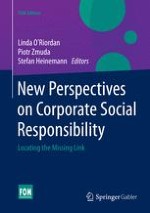2015 | OriginalPaper | Buchkapitel
30. Can Service Learning Foster a Social Responsibility Among Students?—A Didactical Analysis and Empirical Case-Study in Business Education at a German University
verfasst von : JProf. Dr. Karl-Heinz Gerholz, Simone Losch
Erschienen in: New Perspectives on Corporate Social Responsibility
Verlag: Springer Fachmedien Wiesbaden
Aktivieren Sie unsere intelligente Suche, um passende Fachinhalte oder Patente zu finden.
Wählen Sie Textabschnitte aus um mit Künstlicher Intelligenz passenden Patente zu finden. powered by
Markieren Sie Textabschnitte, um KI-gestützt weitere passende Inhalte zu finden. powered by
